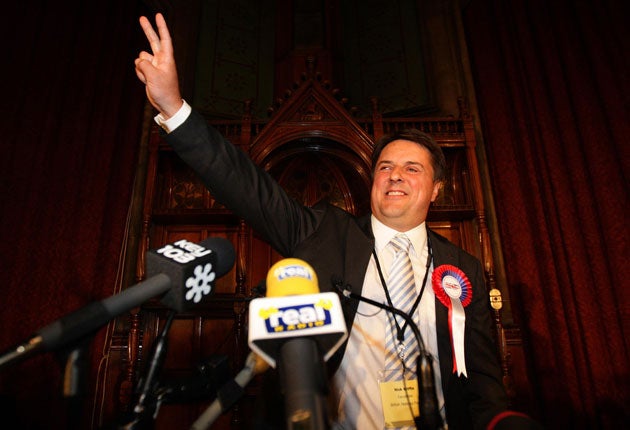Griffin tries to build extremist bloc in Europe
Party will share £22m windfall if it can forge alliance in Strasbourg

Your support helps us to tell the story
From reproductive rights to climate change to Big Tech, The Independent is on the ground when the story is developing. Whether it's investigating the financials of Elon Musk's pro-Trump PAC or producing our latest documentary, 'The A Word', which shines a light on the American women fighting for reproductive rights, we know how important it is to parse out the facts from the messaging.
At such a critical moment in US history, we need reporters on the ground. Your donation allows us to keep sending journalists to speak to both sides of the story.
The Independent is trusted by Americans across the entire political spectrum. And unlike many other quality news outlets, we choose not to lock Americans out of our reporting and analysis with paywalls. We believe quality journalism should be available to everyone, paid for by those who can afford it.
Your support makes all the difference.The British National Party is attempting to patch together an alliance of extremist nationalist organisations across Europe in order to unlock hundreds of thousands of pounds of extra funding.
The party secured its biggest mainstream electoral victory in the early hours of yesterday when Nick Griffin, the chairman of the far-right party, became its second member to be elected to the European Parliament.
Hours earlier, Andrew Brons, a former chairman of the National Front who has a long history in far-right politics, became the party's first MEP after winning almost 10 per cent of the vote in Yorkshire and the Humber.
Mr Griffin achieved his long-term ambition of being elected to Brussels after scraping through to take the last of eight seats for the North East. Both men will be entitled to about £310,000 in annual funding, including an £80,443 salary, a staff budget of up to £182,000 and £40,000 for office expenses. But the British National Party (BNP) could also unlock a share of the £22.8m allowance that is given to parliamentary groups if it can find at least 25 fellow MEPs from seven member states willing to form a bloc within the European Parliament.
Being part of a group is crucial in terms of power as it entitles members to EU funding, a party office, administrative staff and, crucially, the right to vote in committees which are the nerve centre of the Parliament.
A parliamentary group is also entitled to up to £5m of extra funding over the next five-year term.
A number of far-right groups have secured seats in the European Parliament, many of whom hold outwardly racist or neo-fascist policies. Prior to the European elections, high-ranking members of the BNP had attended rallies held by neo-Nazis in both Italy and Hungary.
Simon Darby, the deputy chairman of the BNP, said Mr Griffin would begin looking for groups with which the party could form alliances.
"In the long term it would be to our advantage [to form a bloc]," he said. "Whether we will find people with enough in common I don't know, we'll have to wait for the dust to settle."
Mr Darby, who failed to win an MEP seat in the West Midlands, which had been considered one of the BNP's strongest areas, declined to specify which groups the party was talking to but he said they would look to form an alliance with France's far–right National Front. He added: "We believe in talking to people even if they have different views to our own."
In the run up to the European elections, senior BNP leaders including Mr Griffin and Mr Darby went on a series of trips to Europe to meet with fellow far-right activists.
In April, Mr Darby was welcomed with fascist salutes by members of the Italian nationalist Forza Nuova party during a trip to Milan. Headed by Roberto Fiore, a leading far-right Italian politician and a long-time friend of Mr Griffin, Forza Nuova campaigns for the expulsion of an estimated 150,000 Roma gypsies from Italy.
The BNP already has a relationship with Jobbik, a Hungarian party with its own civilian militia which won three of Hungary's 22 seats. Critics say its policies are overtly anti-Roma and anti–Semitic. Last October Mr Griffin spoke at a rally of more than 5,000 Jobbik supporters in Budapest. He has also met Jobbik activists in London.
A spokesperson for Searchlight, the anti-racism group, told The Independent that their activists would now go to Brussels to monitor the groups with which the BNP forms alliances.
"In the past the BNP have made efforts to keep their dealings with extremist parties across Europe very much under wraps," a spokesperson said. "Now those relationships will be under intense public scrutiny and we will be able to highlight the sort of company that the BNP keep."
Labour MEP for London Claude Moraesa said: "Fascists in the European Parliament where I sit have long wanted members from Britain to join this transnational group so for those reasons there is deep concern that we have now crossed that threshold."
A power base?
*57 councillors, three county councillors, one GLA member, two MEPs, 17,000 members, 65,000 callers to head office during election campaign, 30 full-time administrative staff, two million emails sent during campaign.
Join our commenting forum
Join thought-provoking conversations, follow other Independent readers and see their replies
Comments